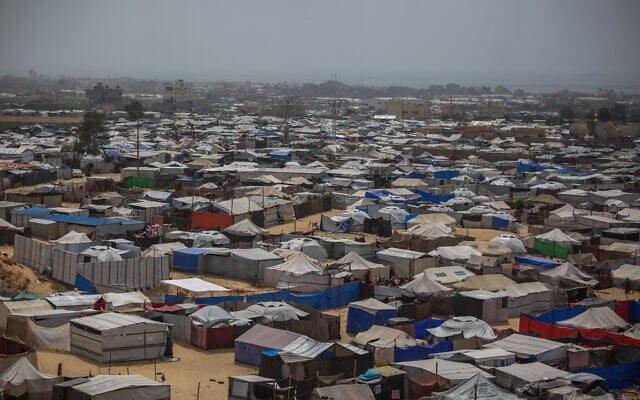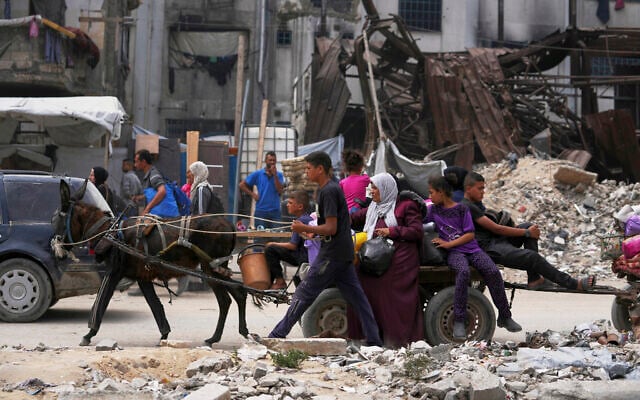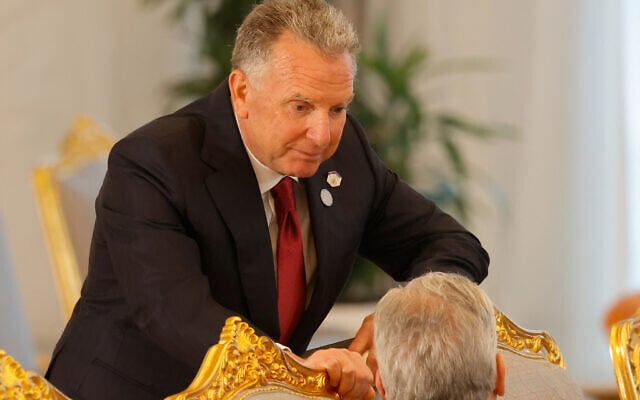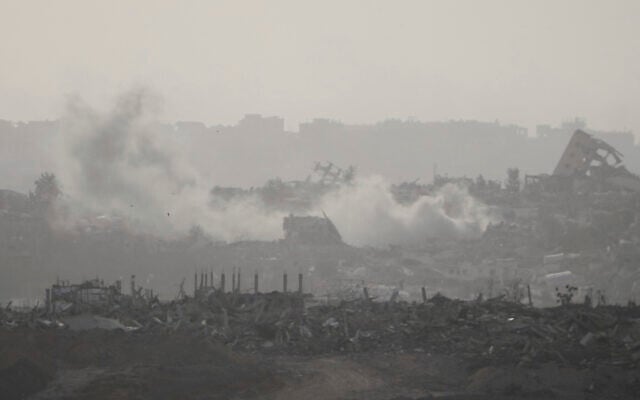


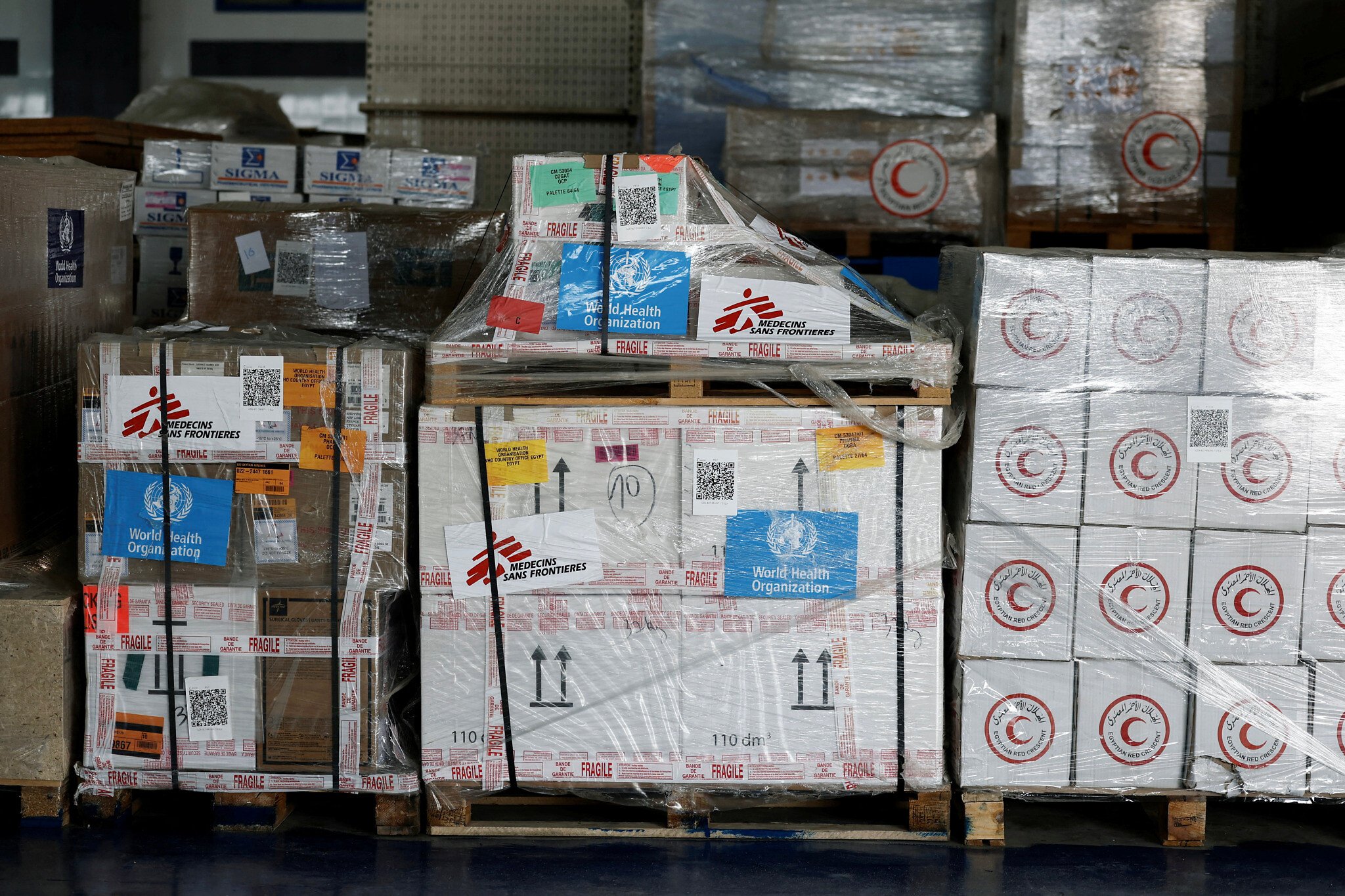
Prime Minister Benjamin Netanyahu ordered the immediate resumption of “basic” humanitarian aid into the Gaza Strip on Sunday evening, making a highly unpopular decision among his right-wing circles amid mounting US pressure to end a monthslong blockade.
The move was approved during a security cabinet meeting at the recommendation of military officials who reportedly warned that food supplies belonging to the UN and aid groups had completely run out, creating an acute humanitarian crisis.
No vote was held among the ministers, some of whom vocally opposed the step, which went against repeated pledges by senior officials in recent months that no aid would resume before a new mechanism was put in place to prevent Hamas from commandeering the supplies. The aid was set to renew via the previously used mechanisms.
In a statement confirming the decision, the Prime Minister’s Office said the aid flow was being restored “at the recommendation of the IDF and due to the operational need to enable the expansion of intense fighting to defeat Hamas.”
The PMO said Israel “will allow the entry of a basic quantity of food for the population in order to prevent the development of a hunger crisis in the Gaza Strip,” as such a crisis “would endanger the continued operation to defeat Hamas.”
“Israel will act to deny Hamas the ability to seize control of the distribution of humanitarian aid in order to ensure that the aid does not reach Hamas terrorists,” the office concluded.
The prime minister’s decision was reportedly made without a vote among ministers — as would generally be expected, even though he is not legally required to — since most of the cabinet opposed the move. National Security Minister Itamar Ben Gvir demanded a vote and was refused. The cabinet proceeded to debate whether or not there is a famine in Gaza.
“The prime minister is making a grave mistake with this move, which doesn’t even have a majority. We must crush Hamas and not simultaneously give it oxygen,” Ben Gvir argued in a statement, as other hawkish politicians and groups joined in pillorying the step.
Shortly after the PMO’s formal announcement, another statement was sent out to reporters in the name of a “senior official,” saying that the aid resumption was a “temporary measure” that would only last for around a week, until the new aid distribution centers in Gaza were up and running.
Most of these centers will be located in the southern Gaza Strip under IDF security control and operated by private US companies, the unnamed official said.
Eri Kaneko, a spokesperson for UN aid chief Tom Fletcher, confirmed the agency had been approached by Israeli authorities to “resume limited aid delivery,” adding that discussions were ongoing about the logistics “given the conditions on the ground.”
The decision to resume aid followed mounting pressure from the US for Israel to end its monthslong aid blockade on the Gaza Strip and avoid a humanitarian crisis that humanitarian organizations say has been well underway for weeks.
Israel has thus far refused to renew the aid, saying Hamas has been stealing the aid to benefit its own members.
However, according to the Walla news site, the resumed transfer of aid will be facilitated through several international organizations, including the UN World Food Programme and the World Central Kitchen, until a new US- and Israel-backed mechanism, known as the Gaza Humanitarian Foundation (GHF), begins operating later this month.
In the United Arab Emirates on Friday, US President Donald Trump said: “We’re looking at Gaza. And we’re going to get that taken care of. A lot of people are starving.”
On Sunday, Trump’s special envoy to the Middle East Steve Witkoff said Israel had “indicated” that it would begin allowing humanitarian aid into Gaza after blocking its entry for over two-and-a-half months.
Witkoff told ABC’s “This Week” that “everyone is concerned about the humanitarian conditions in Gaza” and insisted once again that there was “no daylight” between Trump and Netanyahu on the issue.
“We do not want to see a humanitarian crisis, and we will not allow it to occur on President Trump’s watch,” Witkoff asserted.
The Gaza Humanitarian Foundation, which was established in close coordination with Israel to manage aid distribution in a manner that prevents its diversion by Hamas, has said that it is planning to begin operating in Gaza by the end of the month, but Israel has yet to confirm this.
Through the GHF, aid will only be distributed from a small number of sites in southern Gaza that are secured by American contractors.
Aid organizations currently operating in Gaza have come out strongly against the GHF plan, arguing that it violates humanitarian principles, forces mass displacement of Palestinians who aren’t currently living near the humanitarian zone, ignores vulnerable populations, and doesn’t adequately address the humanitarian crisis.
GHF Executive Director Jake Wood welcomed the aid resumption announcement as an “important interim step,” adding that it was “consistent with the commitment made to us to serve as a bridging mechanism until the Gaza Humanitarian Foundation is fully operational.”
“Through the GHF, we are building a secure, transparent system to deliver aid directly and effectively — without diversion or delay and in strict adherence to the humanitarian principles of humanity, neutrality, impartiality, and independence,” he added.
Aid hasn’t entered Gaza since March 1, with Israel arguing that sufficient humanitarian assistance entered the Strip during a six-week ceasefire and that Hamas has been stealing much of that aid. In recent weeks, though, some officials in the IDF have begun warning the political echelon that the enclave is on the brink of starvation.
Complicating matters, Israel began “broad” ground operations in several areas of the Gaza Strip on Sunday, as part of the opening phase of a new major offensive. Palestinian officials reported more than 100 people killed over the past 24 hours in Israeli strikes.
Meanwhile, IDF Spokesman Brig. Gen. Effie Defrin said in a press statement Sunday evening from the Gaza border that five divisions were now operating inside the Strip.
“We are entering a new stage in the fighting. During the operation, we will increase and expand our operational control in Gaza, while bisecting the Strip and moving the population for its safety in all the areas where we operate,” he said.
Defrin said the IDF had implemented lessons learned from the fighting in Gaza thus far.
“Unlike before, we are now focusing on the offensive effort in the Gaza Strip…until the defeat [of Hamas] in the areas where we operate,” he said.
Defrin added that the IDF was doing “everything” to prevent harm to the hostages Hamas is holding in Gaza. Fifty-eight such captives are still being held, of whom 35 have been declared dead by Israel.
“The fighting is being conducted in full coordination with the [military’s] Hostages and Missing Persons Headquarters [unit]. We are doing everything to prevent harm to the hostages. They are always top of mind,” he said.
“We are moving forward, and the only thing that can stop us is the return of our hostages,” Defrin said.
He also justified the IDF’s vague public statements on its operations in Gaza, saying: “Ambiguity is a tool. We won’t share our plans with Hamas. They will see actions on the ground.”
Times of Israel staff and agencies contributed to this report.

